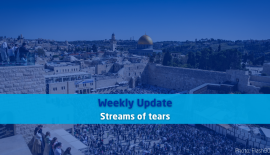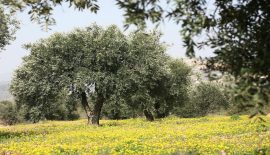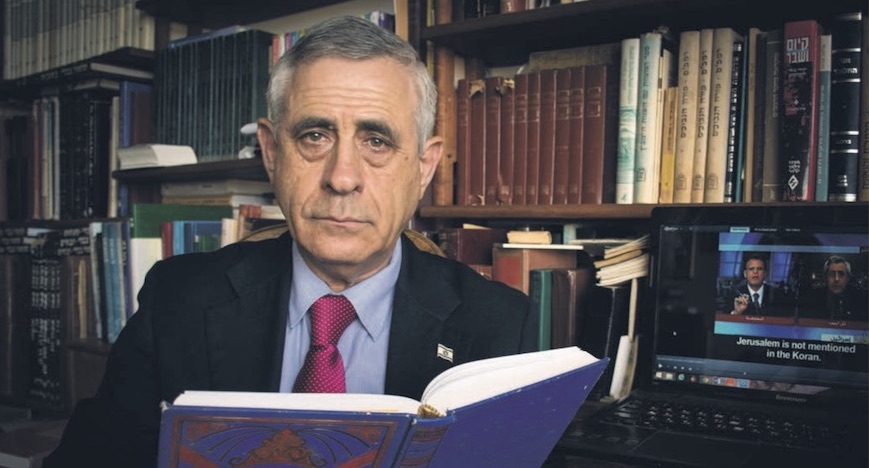Plea for an Eight-State Solution
“There will be no peace if we don’t understand Arab culture.” Dr Mordechai Kedar is an orthodox Jew who speaks fluent Arabic and reads the Qur’an better than many Muslims. Arabic media such as Al Jazeera often invite him to speak, and when he does so, he passionately defends the Jewish state. “Arabs are amazed by Israel; they want to understand how Israel has become such a success in the Middle East”.
How is it that, as an Israeli Jew, you are so fascinated by the Arab culture?
“I had a wonderful teacher in high school who taught Arabic. It was through his classes that I fell in love with the Arabic language. We learned to read and write the language, and we read everything in Arabic from the Qur’an to the Arab newspapers of that time.
My knowledge of Arabic was very useful during my military service. I worked in military intelligence for 25 years, specialising in Islamic groups. At a certain moment, I really needed a sabbatical. So I started intensively studying Arab culture and mentality. I ended up becoming a researcher in the field of Arabic studies at the Bar Ilan University in Ramat Gan.”
Do you think knowledge of Arab culture is necessary in order to understand the Middle East?
“Absolutely! In fact, I think that most of the problems in the Middle East today are the result of the actions over the last 100 years by Western powers who did not understand and therefore did not take into account the Arab way of thinking.
A good example was in 2011. It was called ‘the Arab Spring’. The most respected Middle East commentators in the West looked at the images from Tahrir Square in Cairo and celebrated: democracy is coming in the Middle East! But it was not to be. Look, people in the West have always known democracy. If they see a dictatorship fall, they automatically think it will be replaced by democracy. Naturally, because the West thinks within its own experiential paradigm, and imposes that on the rest of the world. They think that Israeli’s and Palestinians will end up sitting around the campfire singing kumbaya. But that is not the way it works here.”
What do you think we in the West need to understand about Arab culture?
“First of all, we need to understand that tribal and ethnic background are much more important than we often realise. Take the former Yugoslavia. Since Yugoslavia collapsed in the 1990s, seven states, each with a different ethnic background, have been living alongside each other more or less in peace. The Soviet Union also disintegrated after 70 years of existence into separate republics that were established along ethnic lines. However hard we try, ethnicity is alive and kicking! And you can see that in the Middle East. After the First World War, the Western allied powers drew lines in the sand and installed foreign dictators. The Arab Spring was nothing other than the response of ethnic, tribal and family groups to that situation.”
So the Arab States have no legitimacy?
“The Arab world basically comprises a system of foreign dictators ruling various clans, tribes and families. Take Iraq. We have heard a lot in recent years about the different groups in that country: Kurds, Yezidis, and Arabs, comprising different religions – especially Christians, Shi-ite and Sunni Muslims who do not feel united under one flag.
In order to survive in the desert, you are dependent on others. That’s why family and tribal identity are so important in the Middle East. Loyalty to the family and tribe is more important than anything else. An Arab will hide a murderer from the authorities if he belongs to the same tribe; that is the obligation to look after a fellow member of the tribe.
A while ago a talent show was broadcast in the Middle East. There were candidates from many different countries. The winner was a young Syrian boy. When the votes of the viewers were analysed, it was discovered that his supporters were located not only in Syria but also in Iraq and Jordan. This boy was a member of a large tribe, and it was loyalty to the tribe that determined the votes.”
What is the role of Islam in the Middle East?
“Ah! Islam is an attempt to unite many different tribes under one flag. The religion of Islam strives to create the umma, which is the global body of Muslims. But there was resistance to this, even in Mohammed’s time. Islam managed finally, through massive use of violence, to conquer many tribes into submission. But the reality is that Islam has never really been able to destroy ethnic and tribal loyalties. That’s why the umma has never been established, and the Islamic world remains deeply divided. That’s why you see so many Muslims killing each other. Ethnicity is not only alive and kicking; it is alive and killing!”
How does that work amongst the Palestinians?
“There is no such thing as a Palestinian people. Arabs have also never used this word. This area was known as ash-Shām and comprised the area of what today is Syria, Lebanon, Jordan, Israel and the so-called ‘Palestinian territories.’
If you open a telephone book in the Palestinian territories, you will find names like Al-Iraqi, Al-Masri and Al-Houran, which you will also find in Iraq, Egypt and Houran, a region in Syria. The Palestinian territories are populated by a melting pot of different ethnic groups, tribes, religions, and families. They are all supposedly represented by the Palestinian Authority. But the PA was created by Israel and the USA. No-one in the Palestinian territories feels the slightest loyalty towards the PA, because it is a violent and corrupt dictatorship.”
This means there is no negotiating partner for Israel if the Palestinian people do not support their own leaders?
“That’s right, at least not in the form of the Palestinian Authority. Palestinians see the PA as a political dictatorship created by Israel to keep them under control. And they are right. In the Oslo Accords, it was stupid Israelis who agreed to create a terror organisation, led by the mother of all terrorists Yasser Arafat, to lead the Palestinians. Finding a solution for the conflict means finding a solution to that terrible mistake”.
Can you envisage a solution to this conflict?
“I genuinely believe that a solution can be found. It will take common sense and a long-term strategy. I advocate dismantling the PA, and establishing some form of Palestinian emirates. The only system of government that works in the Middle East is a system which takes account of the loyalty of tribes and families. That is the situation in the Gulf States, which enjoy remarkable peace and prosperity. A solution for the Palestinian territories should be based on that model. The biggest families in the Palestinian territories live in the largest cities. You could create eight city-states governed by these families, with extra space around the cities for growth and agriculture. I’m thinking of Hebron, Ramallah, Jericho, Nablus, Jenin, Tulkarem, Qalqilya and Gaza – which is in fact already such a city-state. Bethlehem is more complicated, that would need more thought.”
Gaza? Isn’t that a recipe for eight terror states, like Gaza today?
“As I said, this needs a long-term vision. You cannot solve this problem from one day to the next. Israel is used to living next to hostile nations. We have had huge conflicts with Egypt and Jordan, but we managed to conclude peace treaties with both of them. In this region, you need to maintain a degree of deterrence. As long as your neighbour thinks you can do something nasty to him, he will keep his distance, and you can even live in peace with him. That’s the situation we now find ourselves in with respect to Gaza.”
And what about the rest of the ‘West Bank’?
“My proposal is that Israel annexes the territory between the eight city-states. That would also solve the problem of the settlements. We should offer Israeli citizenship to the Palestinian residents in the smaller towns, if they want it. I think most of them will immediately accept that.
I believe in this plan, as the path to peace in the Middle East. It is the most realistic solution for the long term. If it is implemented, it will take years to establish real peace. But peace will come, provided the Palestinians are prepared to focus on improving their situation and building their future, instead of fighting against Israel”.







